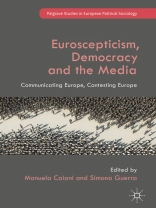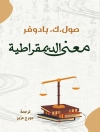This volume focuses on the relationship between the media and European democracy, as important factors of EU legitimacy. The contributors show how the media play a crucial role in making European governance accountable, and how it can act as an intermediate link between citizens and their elected and unelected representatives.
The book focuses on widespread levels of Euroscepticism and the contemporary European crisis. The authors present empirical studies which problematize the role of traditional media coverage on EU attitudes. Comparisons are also drawn between traditional and new media in their influence on Euroscepticism. Furthermore, the authors analyse the impact of the internet and social media as new arenas in which Eurosceptic claims and positions can be made visible, as well as being a medium used by political parties and populist movements which contest Europe and its politics and policies.
Euroscepticism, Democracy and the Media will be of interest to students and scholars with an interest in European politics, political parties, interest groups, social movements and political sociology.
Содержание
1. Communicating Europe, Contesting Europe: An Introduction; Manuela Caiani and Simona Guerra.- 2. Eurosceptic voices: beyond party systems, across civil society; Simona Guerra.- 3. The Spiral of Euroscepticism: Media Negativity, Framing and Opposition to the EU; Charlotte Galpin and Hans Joerg Trenz.- 4. EU Media Coverage in Times of Crisis: Euroscepticism Becoming Mainstream?; Patrick Bijsmans.- 5. Does the Information Source Matter? Newspaper Readership, Political Preferences and attitudes towards the European Union in the United Kingdom, France and the Netherlands; Benjamin Leruth, Yordan Kutiyski, André Krouwel and Nicholas J. Startin.- 6. How the media make European citizens more Eurosceptical; Nicolò Conti and Vincenzo Memoli.- 7. Comparing news diets, electoral choices and EU attitudes in Germany, Italy and the UK in the 2014 European Parliament elections; Lorenzo Mosca and Marco Quaranta.- 8. ‘Not in my Europe’. Extreme right online networks and their contestation of EU legitimacy; Elena Pavan and Manuela Caiani.- 9. Divided they tweet? A comparative analysis of Twitter networks of pro- and anti-EU parties; Annett Heft, Sophia Wittwer and Barbara Pfetsch.- 10. Left’s Love and Hate for Europe: Syriza, Podemos and critical visions of Europe during the crisis; Donatella della Porta, Hara Kouki, Joseba Fernández.- 11. EU u-Government: A Solution for More Citizen Participation in EU Policy-Making; Evangelos Fanoulis and Anasol Peña-Rios.- 12. Europe facing new challenges of contestation and communication: Conclusion; Simona Guerra and Manuela Caiani
Об авторе
Manuela Caiani is Associate Professor at the Institute of Scienze Umane e Sociali at the Scuola Normale Superiore (SNS), Florence, Italy. She has published widely on collective action and Europeanization and on right-wing extremism in Europe and the USA.
Simona Guerra is Senior Lecturer in Politics in the School of History, Politics and International Relations at the University of Leicester, UK. Her main research interests focus on the domestic politics of EU integration, Euroscepticism and Populism, and Religion and Politics. Her publications include Central and Eastern European Attitudes in the Face of Union (Palgrave Macmillan, 2013).












